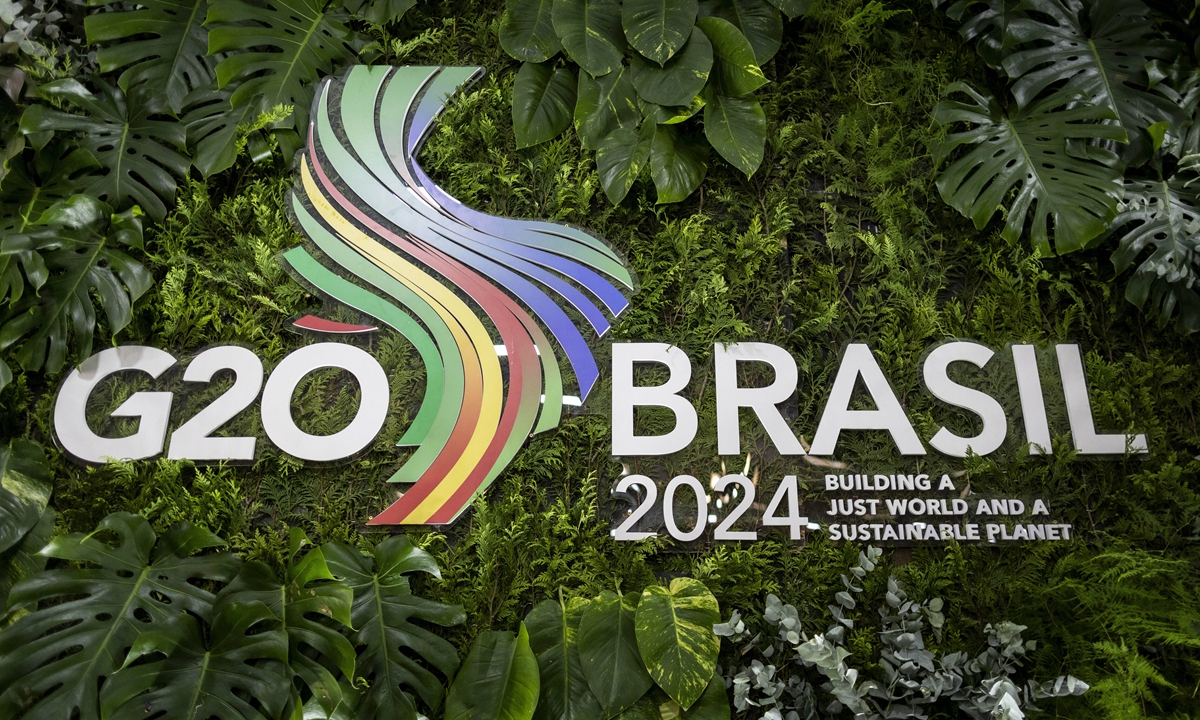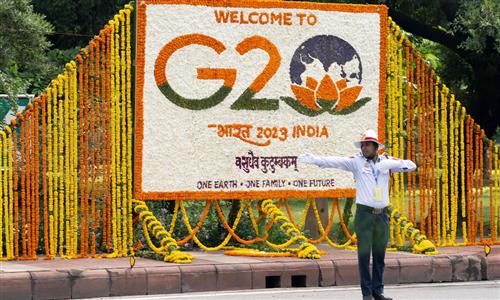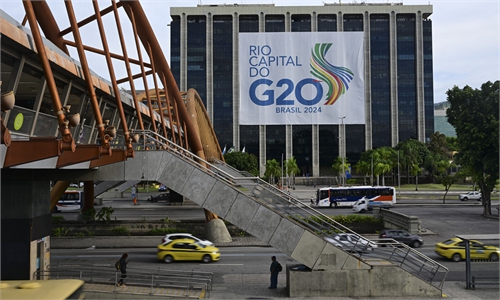Brazil’s call to reform multilateral institutions speaks for broader Global South
Western nations hijack G20 to serve selfish political purposes

G20 foreign ministers meeting in Rio de Janeiro, February 22, 2024. Photo: VCG
At the G20 foreign ministers' meeting in Brazil, Brazilian officials called for reforms of the United Nations and other multilateral institutions, and pushed for stronger representation of developing nations. Chinese experts believe Brazil's call speaks for the broader Global South, as some of those organizations have long been hijacked and dominated by Western countries, while ignoring the needs of developing nations.
Vice Foreign Minister Ma Zhaoxu, who represented China at the G20 foreign ministers' meeting, met with Brazilian Foreign Minister Mauro Vieira in Rio de Janeiro, Brazil on Tuesday, the Chinese Ministry of Foreign Affairs said on Wednesday.
Ma said China is willing to take this opportunity to work with Brazil to follow through on the important common understandings reached between the two heads of state, further synergize development strategies, deepen cooperation in various fields and take China-Brazil relations to a new level. China supports Brazil's work as the G20 presidency to jointly promote the success of this year's G20 Summit.
One of Brazil's key proposals, set by Brazilian President Luiz Inácio Lula da Silva, is a reform of global governance institutions such as the United Nations, the World Trade Organization and multilateral banks, where he wants to push for stronger representation of developing nations, AP reported.
Vieira also said when opening the two-day meeting that the explosion of global conflicts shows international institutions like the UN are not working.
Brazil's call for reform of current multilateral institutions represents the view of the majority of Global South countries. The current international system has been dominated and even hijacked by some Western countries to serve their hegemonic purposes, while overlooking the interests of Global South countries, Li Haidong, a professor at the China Foreign Affairs University, told the Global Times.
Echoing Li, Zhu Jiejin, a professor of global governance studies at Fudan University, told the Global Times that voices calling for development in the Global South will become louder within the G20, as developing countries have been hosting the G20 summit in recent years. Brazil assumed the G20 Presidency from India last year, and South Africa will take up the G20's presidency in 2025.
In 2019, Zhang Jun, China's permanent representative to the United Nations, said that "with a collective rise of developing countries being the defining feature, China supports reasonable and necessary reform of the Security Council to meet the needs of the times."
Experts said that China has been actively promoting the development of the Global South. "One major contribution is promoting the development of BRICS, which brought together major developing countries and amplified the voice of developing nations," said Zhu.
Chinese Foreign Minister Wang Yi said at the Munich Security Conference last week that China has worked actively to strengthen solidarity and cooperation in the Global South, promoted the historic expansion of BRICS membership, supported the African Union in joining the G20, and been committed to increasing the representation and voice of developing countries in global affairs, so as to make the global governance architecture more balanced and effective.
Western foreign ministers from the G20 group of nations meeting in Brazil on Wednesday attacked Russia due to its conflict with Ukraine, Reuters quoted diplomats as saying.
"Russia must be made to pay for its aggression," British Foreign Minister David Cameron told the closed session, according to his office. According to Reuters, the top diplomats from the US, Australia, Canada, Germany, Italy, France and Norway made similar remarks on the first day of a two-day meeting.
"In recent years, Western countries have spared no effort in hijacking multilateral platforms such as G20, turning them into an arena to meet their own political needs," Li said. He said such attempts restricted G20 in carrying out its functions.
Mao Ning, spokesperson of China's Ministry of Foreign Affairs, said at a Wednesday press briefing that the G20 is the premier forum for international economic cooperation, not a platform for resolving geopolitical and security issues.
Apart from the Russia-Ukraine crisis, the Palestine-Israel conflict also became a focal point at this year's G20 foreign ministers' meeting. However, Chinese experts have dim hopes of G20 foreign ministers making progress on this issue, not only due to those countries' differing stances on the conflict, but also because of Lula's war of words with Israel.
Lula is in the middle of a diplomatic spat with Israel over comments in which he likened the war in Gaza to the Nazi genocide during World War II, leading Israel to say he was not welcome there until he takes back the comments.
The more pragmatic approach is to just not engage in deep arguments over those thorny issues at G20, Zhu said. He pointed out that even five permanent members at the UN Security Council almost failed to reach agreement on solving those conflicts for such a long time, "how could 20 countries reach a consensus within two days?"
G20 is a rare occasion in which countries from Global South and Global North can sit together and discuss global governance and challenges facing all of them. It is crucial that G20 is not overshadowed by the selfish political agendas of certain countries, so that it can effectively fulfill its role in addressing these pressing issues, said Zhu.



